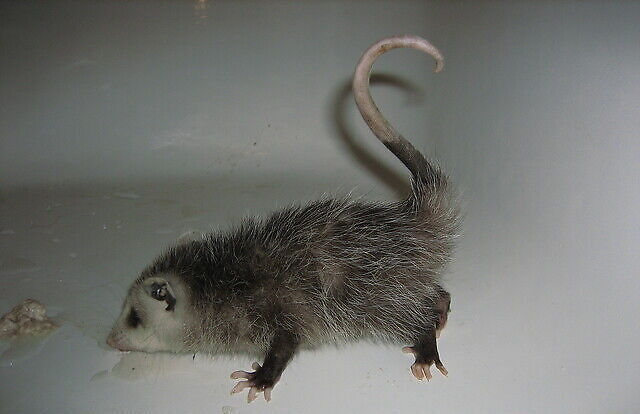Can Opossums Be Good Pets?
You may be wondering whether or not the long-tailed, nocturnal marsupial – the opossum – would make for a good house pet.
While you can find articles and information out on the Internet relaying information that opossums can be kept as pets, this information should be taken with a grain of salt. In other words, it’s not that simple. Ninety-five percent of the time, it is a terrible idea – and often illegal – to own an opossum as a house pet.

Intro
Sometimes people discover an orphaned opossum on their property who is in need of immediate care and attention. If there doesn’t happen to be any wildlife conservation or rehabilitation center nearby, one may be forced, or at least feel obligated, to house the opossum and care for it on their own.
While this is a noble act on the surface, it’s an act that shouldn’t be taken lightly. Nonetheless, if an opossum is taken into personal care by a general citizen, and has been successfully rehabilitated and humanized, there is a slight chance that the opossum could become accustomed to domestic life. However, this is highly unlikely and should not be expected, nor desired.
With some common sense thrown into play, it should be easily understood why an opossum wouldn’t fair well as a house pet. However, to clarify it further, lets now dive into the many reasons why you should not keep an opossum as a house pet.
Why Not?
For starters, an opossum is a wild animal. Need it be repeated? In addition, they are nocturnal marsupials – not an ideal characteristic of a pet. Below are some important and necessary considerations that need to be taken before thinking about raising a baby opossum as your own house pet.
It’s probably illegal where you live. In just about every jurisdiction in the United States, it’s illegal to capture, own, and care for an opossum unless you have a wildlife rehabilitation license and permit to do so. The reason why? Without the proper knowledge and resources needed to take care of a wild animal, much harm can be done, not only to your safety and well-being, but also to the animal. If you happen to fail to comply with even one of the dozens of necessary steps in caring for a wild animal, it can cause death.
Wild opossums are likely to carry diseases. These diseases are also likely to pass to humans. Diseases that opossums may carry include, but are not limited to:
- Rabies: unlikely; however, possible.
- Coccidiosis: A parasitic disease found in the intestinal tract of wild animals.
- Salmonella: A bacterial disease that also affects the intestinal tract.
- Tularemia: A rare disease also known as rabbit fever.
- Toxoplasmosis: Another parasitic disease and infection.
The nature of a wild animal is unlikely to thrive in a domesticated home environment. These animals don’t expect or understand love and affection. They are typically in constant survival mode, prepared to defend against threats at any moment. Pair this with 6 feet tall humans cornering it, and you’re likely to experience a disastrous attack on you or your loved ones. Even if they do seem comfortable, these creatures can turn on you at any point, without warning.
They’re just plain dirty. When considering owning a pet opossum, you may just be looking at the surface level. Maybe it’s cute, or furry, or whatever you may desire of it. However, have you put any thought into its potty-training experience? Urine, feces, smell?
If you’ve been told by someone, or the internet, that an opossum makes a great pet, please think again. If you do happen to come across an estranged opossum and you feel the instinct to help and care for it, do the right thing by contacting your local wildlife control service or wildlife rehabilitation center.
Opossums are not intended to be your cute and fluffy house pet. Stay clear.